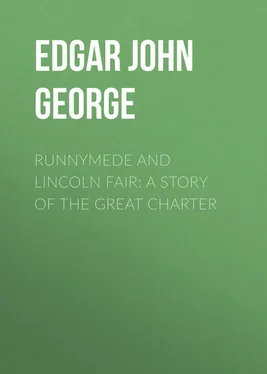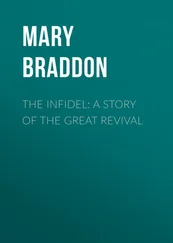John Edgar - Runnymede and Lincoln Fair - A Story of the Great Charter
Здесь есть возможность читать онлайн «John Edgar - Runnymede and Lincoln Fair - A Story of the Great Charter» — ознакомительный отрывок электронной книги совершенно бесплатно, а после прочтения отрывка купить полную версию. В некоторых случаях можно слушать аудио, скачать через торрент в формате fb2 и присутствует краткое содержание. Жанр: foreign_antique, foreign_prose, на английском языке. Описание произведения, (предисловие) а так же отзывы посетителей доступны на портале библиотеки ЛибКат.
- Название:Runnymede and Lincoln Fair: A Story of the Great Charter
- Автор:
- Жанр:
- Год:неизвестен
- ISBN:нет данных
- Рейтинг книги:3 / 5. Голосов: 1
-
Избранное:Добавить в избранное
- Отзывы:
-
Ваша оценка:
- 60
- 1
- 2
- 3
- 4
- 5
Runnymede and Lincoln Fair: A Story of the Great Charter: краткое содержание, описание и аннотация
Предлагаем к чтению аннотацию, описание, краткое содержание или предисловие (зависит от того, что написал сам автор книги «Runnymede and Lincoln Fair: A Story of the Great Charter»). Если вы не нашли необходимую информацию о книге — напишите в комментариях, мы постараемся отыскать её.
Runnymede and Lincoln Fair: A Story of the Great Charter — читать онлайн ознакомительный отрывок
Ниже представлен текст книги, разбитый по страницам. Система сохранения места последней прочитанной страницы, позволяет с удобством читать онлайн бесплатно книгу «Runnymede and Lincoln Fair: A Story of the Great Charter», без необходимости каждый раз заново искать на чём Вы остановились. Поставьте закладку, и сможете в любой момент перейти на страницу, на которой закончили чтение.
Интервал:
Закладка:
Nor was it only in streets and public places that mirth and joviality prevailed. Far otherwise was the case. The houses were decked with branches of holly and ivy for the occasion, and in the abodes of the wealthy, at least, there was no lack of good cheer. Amid frolic and jest large and luxurious dishes were not forgotten or neglected, especially the boar’s head, which was brought to the board and placed thereon in a large silver platter to the sound of musical instruments. But the good cheer was by no means confined to the wealthy. Even the poorest did not on such a day lack the opportunity of being blithe and merry.
Nevertheless Christmas did not pass without its terrors to the superstitious – in that, as in every age, a large proportion of the population. It was believed that at night demons were abroad and on the watch for their prey, and that men were suddenly metamorphosed into wolves, who were called “were-wolves,” and who raged more fiercely against the human race and all creatures not fierce by nature than even the ferocious animals whose shape they were made to assume, attacking houses, tearing down the doors, destroying the inmates, descending into the cellars, drinking mead and beer, and leaving the empty casks heaped one upon another.
In broad daylight, however, and especially where men assembled in crowds to celebrate Christmas, neither the bold nor the timid, who were superstitious, cared much for preternatural terrors; and as Hugh de Moreville and Oliver Icingla entered Ludgate and ascended the hill, and passed the spot where the grand church since known as Old St. Paul’s was about to rise from the ruins of the Temple of Diana, no thought of demons or of were-wolves damped the enjoyment of the Londoners. And loud was the mirth and high the excitement of the populace as through the crowded streets, where standards pierced the sky and evergreens waved and rustled in the frosty atmosphere, slowly and with stately tread rode the Norman baron and the English squire till they reached the Tower, and reined up their steeds, and halted before the great fortress of the metropolis.
CHAPTER V
THE TOWER OF LONDON
ASSOCIATED in the minds of Englishmen with traditions of the Roman conquest of Britain, and with the history of the Norman conquest of England, the Tower of London frowned gloomily, and almost menacingly, on the capital which it had been reared to protect against possible invaders. Indeed, by the Londoners the Tower was regarded with a suspicious eye as a stronghold which might, when occasion served, be used by the rulers of England against their subjects, and especially against the city, which was in the habit of assuming the airs of a free republic in the very face of a monarchy, too proud even to submit, without manifest impatience, to the feudal and ecclesiastical trammels in which it had been involved since the Conquest. But never had the feeling of jealousy been stronger, or more likely to find expression in words, and lead to consequences dangerous to the throne, than at the period when King John kept his Christmas in the Tower, and when Hugh de Moreville, accompanied by Oliver Icingla, presented himself at the great gate to the west of the building, and demanded to be admitted.
It was at this moment that De Moreville, turning on his saddle, and looking Oliver full in the face, took occasion to refer to the subject which, on the previous evening, had kindled the Saxon’s ire, and brought the conversation to a sudden close, and on which they had not once touched, even distantly, during their journey.
“Young man,” said the Norman baron grimly, and with frowning brow, “I would fain have so instructed you to act your part within these walls that your residence at the king’s court might have proved to your own advantage, and for the welfare of others; but my friendly intent has been baffled by your heat and unreasonable pride. One question, however, on the subject ere we part. You have rejected my counsel. May I ask if, under the influence of temptation or threats, you are capable of betraying it?”
“My lord, may God and the saints forbid!” answered Oliver hastily. “Whatever was spoken on the subject was spoken in confidence, and the brave man does not betray the guest seated at his board, and under the rose on his own roof-tree. I pledge my word – I swear to you. But it needs not. You have the honour of an Icingla on which to rely, and the honour of an Icingla is of more worth, in such a case, than assurances or oaths. I have said.”
“It is well,” said De Moreville, who, in spite of his efforts to appear calmly indifferent, could not conceal the relief which he experienced as he listened. “But deem not,” added he, “that I fear aught for myself, or that any breach of confidence on your part could pass unpunished. Breathe within these walls but one word of what I spake with your welfare in view, and, by St. Moden, your doom is fixed!”
As De Moreville spoke the massive gates were thrown open, and the baron and the squire rode into the courtyard, and, dismounting, surrendered their steeds to the attendants.
“Follow me,” said De Moreville, somewhat contemptuously, “and I will conduct you to the king’s presence. I trust,” added he, with a smile of peculiar significance, “that you will find his company more to your taste than mine. Nay, blanch not. Arthur of Brittany found him a kind uncle, and Arthur’s sister, Eleanor the Fair, who pines as a captive in Bristol Castle, has reason to bless his name.”
Oliver shuddered at De Moreville’s tone and manner; and, as the baron’s words sank instantly and deeply into his heart, visions of the dungeon and the gallows rose before his imagination. Not more gloomy could have been his presentiments had some magician, supposed capable of foretelling the future, whispered in his ear the warning inscribed by the Florentine poet over the portals of the infernal regions, “Leave all hope behind.”
But he had now gone too far either to draw back or hesitate; and with a heart as sad as if he had been entering the fabled hall of Eblis, he followed his Norman kinsman till he found himself within the walls which were subsequently so richly adorned by the artists who flourished under the patronage of Henry of Winchester and Eleanor of Provence with the story of Antiochus, but which, in the days of John, were less tastefully decorated.
It was near the hour of dinner, and the king and his courtiers were about to feast in a way worthy of the season and the day; and the great hall of the Tower was crowded with lords of high rank and ladies of rare beauty. Rich and splendid were the dresses which they wore. Indeed, accustomed as Oliver had been for a brief period to the court of Castile, the scene now presented would, under ordinary circumstances, have dazzled his eye and raised his wonder. Courtiers with long hair artificially curled and bound with ribbons, and wearing jewelled gloves and gay mantles, and full flowing robes, girded at the waist with richly-ornamented belts, talked affectedly to ladies not less gaily, but more gracefully, dressed than the other sex, and wearing round the waist girdles sparkling with gold and gems.
But all this display made little impression on Oliver as De Moreville led him to the upper end of the hall; for there, occupying an elevated chair of oak, carved and ornamented, sat a person who eclipsed all present in the magnificence of his attire, and awed all present by an air of superiority which long years of power and authority had made part of himself. He was about fifty years of age, and his hair was grey, almost white; and his countenance was that of a man who had suffered much from care and regret – perhaps something also from remorse. But he was still vigorous, and his form, which, though not tall, was strong and compact, appeared still capable of enduring fatigue in case of necessity. His raiment was gorgeous, and literally glistened and shone with precious stones. He wore a red satin mantle embroidered with sapphires and pearls, a tunic of white damask, with a girdle set with garnets and sapphires; while the baldric, that crossed from the left shoulder to sustain his sword, was set with diamonds and emeralds, and his white gloves were ornamented, one with a ruby, the other with a sapphire. Such were the aspect and dress of him who, surrounded by courtiers and jesters, lorded it over the gay and somewhat gaudy company which kept the Christmas of 1214 in the Tower of London.
Читать дальшеИнтервал:
Закладка:
Похожие книги на «Runnymede and Lincoln Fair: A Story of the Great Charter»
Представляем Вашему вниманию похожие книги на «Runnymede and Lincoln Fair: A Story of the Great Charter» списком для выбора. Мы отобрали схожую по названию и смыслу литературу в надежде предоставить читателям больше вариантов отыскать новые, интересные, ещё непрочитанные произведения.
Обсуждение, отзывы о книге «Runnymede and Lincoln Fair: A Story of the Great Charter» и просто собственные мнения читателей. Оставьте ваши комментарии, напишите, что Вы думаете о произведении, его смысле или главных героях. Укажите что конкретно понравилось, а что нет, и почему Вы так считаете.












